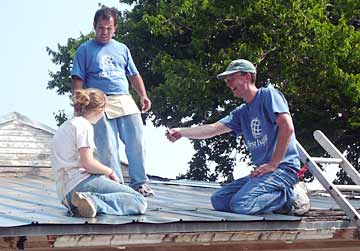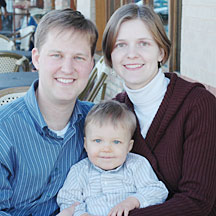After years of decline, West Africa missions picks up momentum
Posted: 6/29/07
| The Lees are moving to West Africa this summer to help start churches among an unreached people group. They were one of three couples appointed by the IMB to the region in March. Jason and Dorothea have three children—Janet, Jacqueline and Jacob. (IMB/BP photos) |
After years of decline, West Africa
missions picks up momentum
By Shawn Hendricks
International Mission Board
RICHMOND, Va. (BP)—The image was as clear as a photograph.
Several years ago, Dorothea Lee was sitting on a tour bus with her college choir group when she had a vision of an African boy. She blinked and turned her head, but she couldn’t shake the image. She prayed, “Lord, what does this mean?”
“And God told me, ‘You will go,’” said Lee, a new Southern Baptist missionary.
Flash forward to last year. As Lee and her husband, Jason, were deciding where they would serve, the International Mission Board began a yearlong focus on West Africa—regional summits at churches, bulletins, brochures, magazine articles and other promotional materials.
 |
| Several years ago, Dorothea Lee saw a vision of an African boy. She said that vision, along with the International Mission Board’s yearlong emphasis on West Africa, helped lead her family to the mission field. |
“What the West Africa emphasis did for us is clarify the needs,” Jason Lee said. The emphasis “put in the forefront, not only for us, but others across the denomination to be praying for this region. And, I know it (clarified) where God wanted us to go.”
The Lees, members of First Baptist Church of Highlands, go to West Africa this summer to help start churches among a Muslim people group with no access to the gospel. They were one of three couples appointed by the International Mission Board to the region in March and are part of an emerging trend in a once-struggling region.
In the late ’90s, the number of missionaries in West Africa took a freefall, tumbling from 400 to 250. Regional leader Randy Arnett describes the number of outreach groups as “an embarrassment.”
“When we first started talking about an emphasis, West Africa was in a sorry shape,” Arnett said. “Things weren’t going real well.”
West Africa regional leadership hoped the yearlong emphasis would help turn things around.
“Things are changing,” he added. As of last fall, the number of personnel had risen 11 percent—the largest percentage increase since the region began tracking that number in 1997. The region expects to appoint more missionaries—eight couples and three singles—this year than in the last three years combined.
“The response has been phenomenal,” said Roger Haun, West Africa’s regional associate.
“We’ve been very pleased by the number of Southern Baptists who have responded. It’s been beyond our wildest expectations.”
Other highlights include:
• 20 churches have signed on as “engaging churches,” or what is sometimes referred to as a “strategy coordinator churches.” These churches accept the responsibility of adopting an unreached people group and developing a strategy to start churches among them. Before the emphasis, the region didn’t have any engaging churches.
• More than 120 other churches have made some type of commitment to help missionary work in the region.
• The number of prayer partners for the region has leapt from about 100,000, reported two years ago, to 400,000 today.
“I realize so much of the results have really been founded in prayer,” Arnett said. “I believe we can see a direct correlation between the increasing numbers of people praying for West Africa and the results we are seeing.”
• The number of new outreach groups and responses to the gospel also has risen in the last 12 months and “pockets of believers” are emerging.
“We are seeing pockets of response like we have never seen before,” Arnett said. “Not just one or two here and there, but 15 over here and 20 over here and 30 over here and here’s a dozen over here.
“When you hear about 12 Muslim women coming up to a volunteer team and saying, ‘We want to receive Jesus,’ that’s cause for celebration. That kind of stuff has not happened in the past.”
But West Africa still has a long way to go.
More missionaries are needed in this vast region that continues to explode with growth. In Nigeria, only one couple is working among the Hausa, a people group of 28 million.
West Africa also needs more single male missionaries. Right now, there are 47 single women missionaries working in the region, compared to three men.
God is “opening the doors of opportunity for witness” for the women, Arnett said. “This … is a tribute to their courage, to their stamina, to their dedication, to their strength of character.”
The region remains optimistic that great things are on the horizon for West Africa.
“Our people, our missionaries, they are bolder today than they’ve been before,” he says. “And we’re seeing results. There is momentum.”
News of religion, faith, missions, Bible study and Christian ministry among Baptist churches, in Texas, the BGCT, the nation and around the world.


